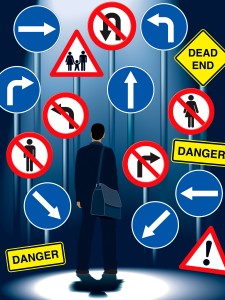Tax Exempt Sales – Read these “rules of the road”
 Think that just because you’re not a retailer you don’t owe sales tax? Think again. More and more traditionally non-taxable transactions are being taxed all over the US. If you’re not up to date, you could have been charging wrong rates (or not charging at all) all this time. And that can add up to an audit that could potentially cripple your business. But it doesn’t end there.
Think that just because you’re not a retailer you don’t owe sales tax? Think again. More and more traditionally non-taxable transactions are being taxed all over the US. If you’re not up to date, you could have been charging wrong rates (or not charging at all) all this time. And that can add up to an audit that could potentially cripple your business. But it doesn’t end there.
Let’s say you don’t have a sales tax obligation. Congratulations! Businesses that don’t have a sales tax burden often have a much more stringent set of rules to follow to maintain tax compliance. Most of the time, those rules pertain to tax exempt sales. And those are one of the hardest areas to keep straight – for ANY business. The inevitable confusion regarding tax-free sales isn’t for the faint of heart.
So how do you make sure you’re doing your due diligence? Here’s some quick tips:
1. Watch out for potholes
Many companies assume that services delivered in conjunction with goods sold (e.g., swimming pool and pool cleaning, computers and maintenance, construction materials and installation) aren’t taxable—an erroneous assumption. States like Delaware, Hawaii, New Mexico, South Dakota, and Washington tax most services. Still others, like Texas and Minnesota, are actively expanding service taxability.
Do yourself a favor and work with tax experts like Avalara’s Professional Services to do an analysis of which services require sales tax collection.
2. Keep your proof of insurance handy
Even if you don’t sell direct to consumers, you may still be part of the transaction through a supply chain. As such, it is your job to prove that you are exempt from collecting tax. Have you ever actually read one of those forms? Depending on the state, they can read a lot like stereo instructions…in another language…that you don’t speak. And if an exemption certificate is invalid, out of date, or missing, you can be liable for the sales tax not collected.
Make sure you have current “insurance cards” on you when you get pulled over by keeping digital copies and automating the collection process with services like CertCapture.
3. Follow traffic laws, even if you think they don’t apply to you
If you have a website and make sales through it, you might be in for a hard left: Many states now collect sales tax on online sales. Many states (e.g., Florida, Texas, California) are requiring out-of-state online sellers to collect sales tax for the first time. If the national effort to effectively end tax-free online shopping succeeds, the already difficult risk-prone sales tax problem will worsen. Add in drop shipping and you have a recipe for a traffic jam.
Keep your online shopping cart up to date with taxability, sourcing, rates, and rules by using an automation service that has a pre-built integration with your system.
Want to learn more ways to survive a potential tax exempt wreck? Contact Front Line Systems to get a handle on your sales tax compliance situation.


Leave a Reply